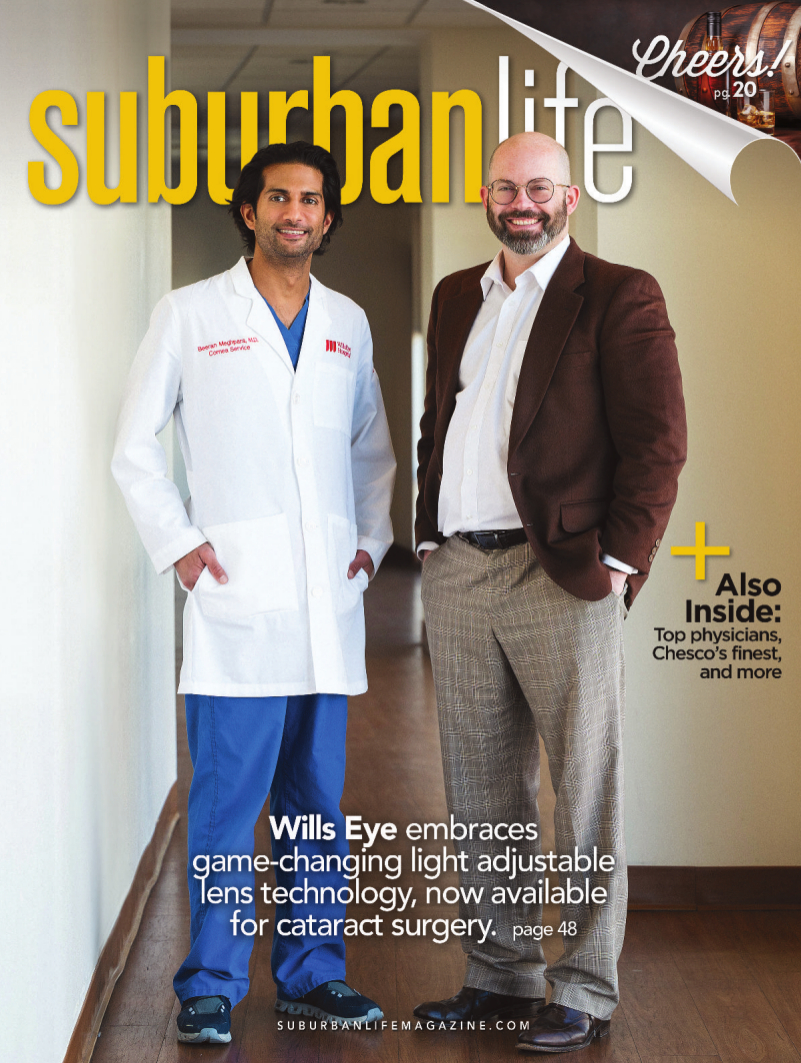
Forging Ahead
Wills Eye embraces game-changing light adjustable lens technology, now available for cataract surgery.
Establishing and maintaining a reputation as a world-renowned leader in eye care for nearly two centuries is no easy task.
One reason the team at Wills Eye has reached that standard is because it is unafraid of breaking new ground in ophthalmology. The latest evidence of that philosophy is Wills Eye becoming one of the first practices in the Philadelphia area to offer an innovative treatment option for a common malady that impacts just about everyone at one point or another.
Light adjustable lens (LAL) technology provides an alternative to traditional cataract surgery. The technology enables Wills Eye doctors to adjust prescriptions and maximize patients’ vision improvement in a noninvasive manner. Because cataracts—clouding of the lens—will affect most people, especially as they age, this surgical advancement could be a game-changer for local patients.
“We always like to keep innovation in mind, especially if something can be as impactful as this is,” says Beeran Meghpara, M.D., co-director of the Wills Eye Refractive Surgery Department. “We’re always on the lookout for what’s new and upcoming. Wills has always been great about that in all the different fields that involve eye care. We also take a cautious approach; we want to make sure that whatever we’re going to incorporate into our practices has had good results, and that there is a track record before we start recommending it to our patients.”
LAL was developed within the past decade and is becoming more widespread in recent years. In addition to Dr. Meghpara, fellow Wills Eye physicians Doug Wisner, M.D., and Nick Hadjokas, M.D., offer it to patients who would be considered good candidates.
For those who have not yet begun to experience cataracts, Dr. Hadjokas, cornea/cataract surgeon and light adjustment specialist, outlines the warning signs that surgical intervention may be necessary.
“Usually patients start to feel that their vision is getting worse,” he says. “Colors might be washed out, and they might see more glare from lights, especially at night or while driving in the rain. These can all be signs that cataracts are progressing and becoming visually significant, to the point that a patient can see better after having cataracts removed.”
In a regular cataract operation, the natural, cloudy lens is replaced with a clear, artificial lens. Before surgery, the Wills Eye team tries to match the new lens to the patient’s eye by taking measurements based on the curvature, shape, and length of the eye. It can be quite accurate, though not 100 percent so, and sometimes patients will need to wear glasses after the procedure.
“With the LAL, we still take all of those same measurements, and we still get a good outcome even before we start to do adjustments,” Dr. Meghpara adds. “But, after we let the eye heal and let everything settle into place, we can measure what prescription the patient has and adjust the lens up to three times to make corrections. So the benefit is we can offer patients better uncorrected vision and increase the likelihood that they won’t have to wear glasses after surgery.”
Adjustment of the lens usually starts about three weeks after surgery and takes three to five treatments. “Our current technology and ability to achieve precise outcomes has improved greatly over the past decade, and is very accurate,” Dr. Wisner, director of the cataract and primary eye care service, says of traditional cataract surgery. “But it is based on measuring the eye before surgery, and predicting where we will land afterwards. The difference with the LAL is that we can precisely adjust our focus after surgery, and this gives us an added level of precision, as well as the chance [for patients] to ‘test drive’ different ranges of vision.”
The Wills Eye doctors share that most patients would be good candidates for LAL, but particularly those who are motivated to not wear glasses or readers, or those who have previously undergone LASIK surgery. LAL has received rave reviews since the practice started offering the procedure.
“Patients are very happy with the quality of vision,” Dr. Hadjokas says. “The results with the LAL are even more accurate than standard lenses, and patients seem to really like the ability to test drive their vision. They like to have peace of mind—they’re not just getting the first lens and having to live with it or get a pair of glasses. They can get this lens and adjust it in the eye afterwards.”
Dr. Meghpara likens the technology to “something you would see in a science-fiction movie.”
“Basically, the way the lens is adjusted, we change the shape of it,” he adds. “We use an ultraviolet light to take these microscopic particles and move them in the lens. Once we have an outcome we are happy with, we lock the particles in place so the lens can no longer change shape. It’s all noninvasive, and after the surgery is done in our Center City hospital or one of our suburban surgical centers, all follow-ups and adjustments are done in the office. You don’t have to have surgery again.”
LAL will soon be rolled out to other Wills Eye-employed surgeons, and Dr. Wisner is eager for more and more patients to reap its benefits. He is proud to work for a practice devoted to advancing ophthalmology.
“I am also proud of the fact that we can provide cutting-edge, precision treatment such as the LAL, while also providing excellent care for people who couldn’t otherwise access it through our numerous charity care vehicles,” he says. “There are not many places that can do this. Wills has been around since 1832, almost 200 years, because we take good care of people. Patients can trust that we have their best interests at heart, and will create individualized and evidence-based solutions to improve or save their vision.”
Wills Eye Hospital
Beeran Meghpara, M.D.
840 Walnut Street, Suite 920
Philadelphia, PA 19107
willseye.org
Beeran Meghpara, M.D.
840 Walnut Street, Suite 920
Philadelphia, PA 19107
willseye.org
Wills Eye Physicians King of Prussia
Nicholas Hadjokas, M.D.
901 E. Eighth Avenue, Suite 101
King of Prussia, PA 19406
willseye.org/wills-eye-physicians-king-of-prussia
Nicholas Hadjokas, M.D.
901 E. Eighth Avenue, Suite 101
King of Prussia, PA 19406
willseye.org/wills-eye-physicians-king-of-prussia
Wills Eye Physicians Bailey Weber Wisner
Douglas M. Wisner, M.D.
4060 Butler Pike, Suite 100
Plymouth Meeting, PA 19462
Baileyweberwisner.willseye.org
Douglas M. Wisner, M.D.
4060 Butler Pike, Suite 100
Plymouth Meeting, PA 19462
Baileyweberwisner.willseye.org
For scheduling, call (877) AT-WILLS.
Photo by Jeff Anderson
Published (and copyrighted) in Suburban Life magazine, February 2024.



